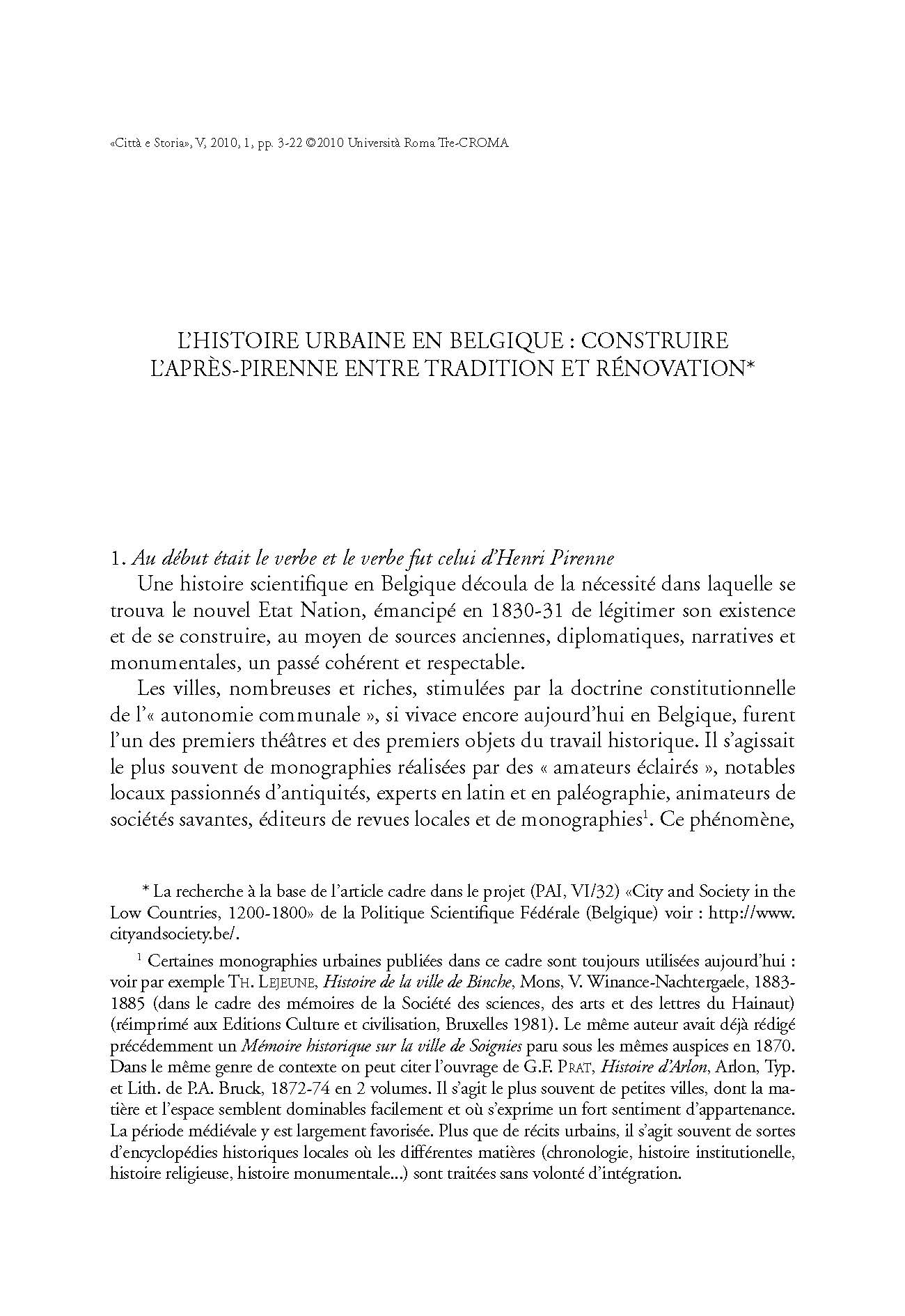L’histoire urbaine en Belgique : construire l’après-Pirenne entre tradition et rénovation
6,00 €
In the decades following its creation in 1830, the young Belgian state was in search of historical legitimacy. Identification often passed through a process of identifying first with one’s city – as is often still the case. A multitude of urban histories, often of great value, was therefore produced by local authors and/or locally bound learned societies. At the end of the 19th century, history underwent, also in Belgium, a process of becoming more outspoken professional. Central figure in this development and god-father for generations of Belgian historians to come was the mediaevalist Henri Pirenne (1862-1935) formed in Liège but active for almost forty years at Ghent university, before moving to Brussels at the very end of his career. One of Pirenne’s most outspoken fields of study was urban history, a topic he studied and many of his pupils who spread over most of Belgian universities, engaged in. For decades he set the agenda, promoting subjects such as the origins of cities and their spatial organisation, the ‘urban democracies’ and the action of urban based social groups, elites and craftsmen alike, urban economy. These themes have proven very inspiring and successful: up till the actual generation of urban historians have experienced with them, mainly for the medieval and early modern period. The political and linguistic complexities of Belgian society are such that a nationally oriented common research is not easily possible. The article shows at length – mobilising many examples – how historians have struggled with this and how they have succeeded to keep the flame of research in urban history awake and burning. The actual themes are partly in line with those already put forward in Pirenne’s time, but connect easily to what is now common ground in international research (questions of identities, social capital, the multi-layered meaning of space etc.). One aspect has not changed since the early days of Pirennian history: Belgian historians are still active on the old divide between the Germanic and Latin parts of Europe and facilitate intellectual exchange while maintaining a great and powerful tradition.
In the decades following its creation in 1830, the young Belgian state was in search of historical legitimacy. Identification often passed through a process of identifying first with one’s city – as is often still the case. A multitude of urban histories, often of great value, was therefore produced by local authors and/or locally bound learned societies. At the end of the 19th century, history underwent, also in Belgium, a process of becoming more outspoken professional. Central figure in this development and god-father for generations of Belgian historians to come was the mediaevalist Henri Pirenne (1862-1935) formed in Liège but active for almost forty years at Ghent university, before moving to Brussels at the very end of his career. One of Pirenne’s most outspoken fields of study was urban history, a topic he studied and many of his pupils who spread over most of Belgian universities, engaged in. For decades he set the agenda, promoting subjects such as the origins of cities and their spatial organisation, the ‘urban democracies’ and the action of urban based social groups, elites and craftsmen alike, urban economy. These themes have proven very inspiring and successful: up till the actual generation of urban historians have experienced with them, mainly for the medieval and early modern period. The political and linguistic complexities of Belgian society are such that a nationally oriented common research is not easily possible. The article shows at length – mobilising many examples – how historians have struggled with this and how they have succeeded to keep the flame of research in urban history awake and burning. The actual themes are partly in line with those already put forward in Pirenne’s time, but connect easily to what is now common ground in international research (questions of identities, social capital, the multi-layered meaning of space etc.). One aspect has not changed since the early days of Pirennian history: Belgian historians are still active on the old divide between the Germanic and Latin parts of Europe and facilitate intellectual exchange while maintaining a great and powerful tradition.

